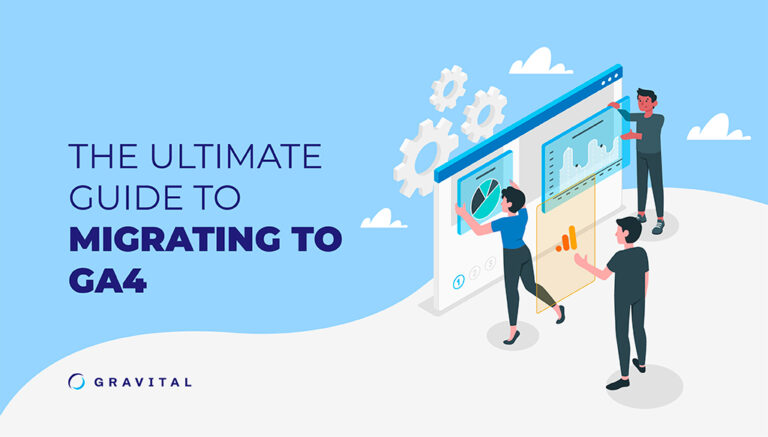In today’s digital age, data is a crucial asset for businesses looking to succeed online. And when it comes to tracking and analyzing data, Google Analytics is one of the most powerful tools available. Recently, Google released a new version of their analytics platform, called Google Analytics 4 (GA4), which offers even more features and functionalities than the previous version, Universal Analytics. However, migrating to GA4 can be a complex process that requires careful planning and execution. In this blog post, we will outline some best practices for a successful migration to GA4, and explain how Gravital Agency can help businesses navigate this transition to achieve the best possible results.
ALSO READ: GOOGLE ANALYTICS 4 TO REPLACE UNIVERSAL ANALYTICS: WHAT’S THE SAME? WHAT’S THE DIFFERENCE?
Migrating to Google Analytics 4 (GA4) is a critical step for businesses who want to leverage the latest features and functionalities of Google Analytics. In this blog post, we will outline some best practices for a successful migration to GA4.
10 Best Practices for a Successful Migration to Google Analytics 4
1. Understand the Differences Between GA4 and Universal Analytics
Before starting the migration process, it is important to understand the differences between GA4 and Universal Analytics. GA4 is built on a new data model, which means that some of the metrics and dimensions are different from Universal Analytics. For example, GA4 uses events instead of pageviews and sessions, and the reporting interface is different. Therefore, it is important to get familiar with the new data model and understand how it affects your data collection and analysis.
2. Set Up a New Property in GA4
To start using GA4, you need to create a new property in your Google Analytics account. This property will be separate from your existing Universal Analytics property, which means that you can run both properties in parallel until you are ready to switch to GA4. Setting up a new property in GA4 is easy, and Google provides step-by-step instructions to guide you through the process.
3. Install the GA4 Tracking Code
Once you have created a new property in GA4, you need to install the GA4 tracking code on your website. The GA4 tracking code is different from the Universal Analytics tracking code, so you need to make sure that you install the correct code. The GA4 tracking code uses the gtag.js library, which is a new JavaScript library that allows you to send data to multiple Google products, including GA4, Google Ads, and Google Marketing Platform.
4. Set Up Event Tracking
In GA4, events are used to track user interactions on your website, such as clicks, form submissions, and video plays. To get the most out of GA4, you need to set up event tracking on your website. Event tracking allows you to collect data on specific user actions, which can help you understand how users engage with your website and identify areas for improvement.
5. Set Up Conversions
Conversions are the ultimate goal of your website, whether it’s making a sale, filling out a form, or signing up for a newsletter. In GA4, you can set up conversions to track specific actions that lead to a conversion. This can help you understand which actions are most effective in driving conversions and optimize your website accordingly.
6. Use Custom Dimensions and Metrics
Custom dimensions and metrics allow you to collect and analyze data that is specific to your business. In GA4, you can create custom dimensions and metrics to track data such as customer lifetime value, product categories, or user roles. This data can help you gain insights into your business that are not available through standard GA4 metrics and dimensions.
7. Test and Validate Your Data
Before switching to GA4, it is important to test and validate your data to ensure that it is accurate and reliable. Google provides a data validation tool that allows you to check your data for common issues, such as missing data or duplicate events. You can also use the Realtime report in GA4 to test your data as you collect it.
8. Plan Your Data Migration
Once you are ready to switch to GA4, you need to plan your data migration carefully. Google provides a data migration tool that allows you to transfer your Universal Analytics data to GA4. However, there are some limitations to the migration tool, and you may need to do some manual work to ensure that your data is migrated correctly.
9. Update Your Reports and Dashboards
After migrating to GA4, you need to update your reports and dashboards to reflect the new data model and metrics. This mayinclude creating new reports and dashboards, modifying existing reports and dashboards, and training your team on how to use the new reporting interface. It is also a good idea to review your goals and KPIs and make sure that they are aligned with the new data model.
10. Monitor Your Data and Make Adjustments
Finally, it is important to monitor your data in GA4 and make adjustments as needed. GA4 provides real-time data, which means that you can see how users are interacting with your website as it happens. Use this data to identify areas for improvement, test new features and functionalities, and make data-driven decisions to optimize your website and improve your business results.
Migrating to GA4 requires careful planning and execution to ensure a successful transition. By understanding the differences between GA4 and Universal Analytics, setting up a new property, installing the tracking code, setting up event tracking and conversions, using custom dimensions and metrics, testing and validating your data, planning your data migration, updating your reports and dashboards, and monitoring your data and making adjustments, you can maximize the benefits of GA4 and improve your website performance.
Don’t forget to also keep up with the latest updates and best practices from Google with Gravital Agency to stay ahead of the game!
As a digital marketing agency, Gravital Agency is committed to staying up-to-date with the latest trends and best practices in the industry, including the migration to Google Analytics 4. By offering our clients guidance and support in migrating to GA4, we help them stay ahead of the curve and maximize the benefits of this powerful analytics tool. Our expertise in GA4 migration, combined with our focus on delivering the best possible results for our clients, makes us a valuable partner for businesses looking to improve their online performance.
Contact us, we’re an international team of agile hybrid professionals with decades of experience and a variety of super powers!


